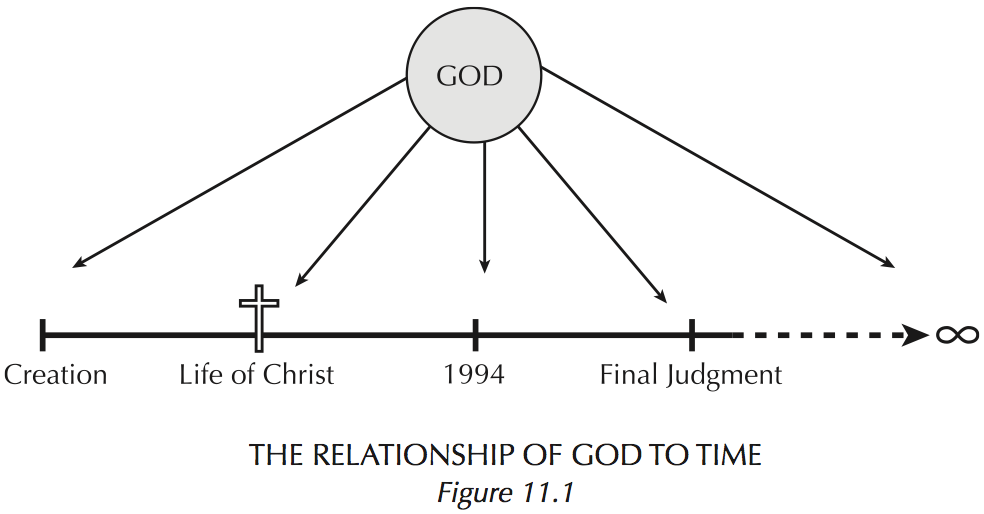Reading Systematic Theology with Wayne Grudem: The Incommunicable Attributes of God: How is God different from us?
This post is part of a 50+ post series from the classic work by Wayne Grudem (PhD, Cambridge), Systematic Theology: An Introduction to Biblical Doctrine. The aim of each post is to provide an overview of each chapter in the book and related resources for each topic.
Synopsis of Chapter
In this next chapter, Wayne Grudem begins to describe the attributes of God. In this section, he covers what theologians typically refer to as the incommunicable attributes of God or “those attributes that God does not share or ‘communicate’ to others.” Grudem seems to be following a more traditional explanation, though he shares concerns on how these distinctions between communicable attributes and incommunicable attributes is not always the most helpful. He then reviews some of the ways Scripture describes God through his names and analogies in creation.
In the next section, Grudem reviews several of the incommunicable attributes of God which includes independence, unchangeableness, eternity, omnipresence, and unity. There are several challenges to these attributes which he covers sufficiently. He even includes several illustrations to better explain some of the attributes. One of the best sections of the chapter is where Grudem shows God is not merely a collection of attributes, but he possesses characteristics which describe his whole being. Moreover, one attribute is not more important than other attributes.
Incommunicable Attributes & Anthropomorphic Language
God is not like us. It seems right to stress this point before explaining who God is. And some attributes more fully explore God’s differences with creation. In describing the incommunicable attributes of God, we are to understand these attributes are those we share less with God. God is not like us, and in some ways he is very different.
Though we may not share God’s exact character, God has revealed himself in Scripture in several ways to show us who he is. In the Bible, he gives us various descriptions and names that clarify his true character. God is disclosing to us some real aspect of his character. For instance, the Bible compares God to…
- A lion (Isaiah 31:4)
- An eagle (Deuteronomy 32:11)
- A lamb (Isaiah 53:7)
- A hen (Matthew 23:37)
- The sun (Psalm 84:11)
- The morning star (Revelation 22:15)
- A light (Psalm 27:1)
- A consuming fire (Hebrews 12:29)
- A rock (Deuteronomy 32:4)
- A tower (Proverbs 18:10)
- A hiding place (Psalm 119:114)
- A bridegroom (Isaiah 61:10
- A father (Deuteronomy 32:6)
- A shepherd (Psalm 23:1)
- A physician (Exodus 15:26)
God is not any one of these physical things or people, rather he is similar to each of these things in some way. God may not perfectly represent anything like this on earth, but much of creation reveals something about God. This is known as anthropomorphic language or “language that speaks of God in human terms.” The Bible uses certain language to describe God that is very “earthy”. It may not seem exalted or becoming of such a majestic being, but it is how God has been pleased to reveal himself to us.
One of the reasons the Bible explains God with phenomena from the natural world is because God made the universe to showcase his glory. The angels in Isaiah declared “the whole earth is full of his glory.” (Isaiah 6:3). And so we may not understand God completely, but we can know something true about God as we study the things he has made.
Independence: An Incommunicable Attribute of God
The first incommunicable attribute of God is independence. God’s independence can be defined as follows: “God does not need us or the rest of creation for anything, yet we and the rest of creation can glorify him and bring him joy.” Several verses shed light on God’s independence:
- “The God who made the world and everything in it, being Lord of heaven and earth, does not live in temples made by man, nor is he served by human hands, as though he needed anything, since he himself gives to all mankind life and breath and everything.” (Acts 17:24-25)
- “Who has first given to me, that I should repay him? Whatever is under the whole heaven is mine.” (Job 41:11)
- “Worthy are you, our Lord and God, to receive glory and honor and power, for you created all things, and by your will they existed and were created.” (Revelation 4:11)
And so God does not need anything from us or anything else in creation. He is fundamentally different from us. More different than a candle is to the sun or a raindrop is different from an ocean, God is of a different order from his creation. God does not need creation to complete anything in himself.
And yet, somehow creation is meaningful to him. God delights in his creation, including the creation of his people. In Isaiah 43:7, God speaks of “everyone who is called by my name, whom I created for my glory, whom I formed and made.” This means God somehow enhances his reputation by creating people. In addition, God speaks of his people in joyous terms: “as the bridegroom rejoices over the bride, so shall your God rejoice over you.” (Isaiah 52:5b). So God delights in his redeemed people, though he does not need anyone.
Unchangeableness: An Incommunicable Attribute of God
Another incommunicable attribute of God is that he doesn’t change. In other words, “God is unchanging in his being, perfections, purposes, and promises, yet God does act and feel emotions, and he acts and feels differently in response to different situations.” God’s unchangeableness is also called immutability.
Scripture explains God’s unchangeableness in several ways…
- “Of old you laid the foundation of the earth, and the heavens are the work of your hands. They will perish, but you will remain; they will all wear out like a garment. You will change them like a robe, and they will pass away, but you are the same, and your years have no end. (Psalm 102:25-27)
- “For I the LORD do not change; therefore you, O children of Jacob, are not consumed.” (Malachi 3:6)
- “Every good gift and every perfect gift is from above, coming down from the Father of lights, with whom there is no variation or shadow due to change.” (James 1:17)
And so God does not change – very unlike his creation. But what about when the Bible speaks of God changing?
There are several examples when God seemed to change in Scripture. In one instance, he was sorry about making man (Genesis 6:6). In another passage, he changed his mind about destroying Israel (Exodus 32:9-14). In a famous passage, he failed to destroy Ninevah after saying he would judge the city (Jonah 3:4-10). In these instances, God’s actions changed as the situation developed, but his character was unmoved. God was thus unchangeable in his being, but reacted when something else happened: namely he was merciful when people repented or when someone prayed. The instance in Genesis 6 seems to be anthropomorphic where God’s eternal will was unmoved while his permissive will was saddened when people rebelled.
Some have challenged God’s unchangeableness in process theology. They suggest that God, like creation, is subject to change which (they say) is an essential attribute of being. But in wanting a god who is personal, these theologians deny the infinity of God. God is not like us (Numbers 23:19). God’s character is not changeable. And this attribute is one of the reasons we can trust him. Whatever he said, that he will do. Whatever he purposed, that he will accomplish. And for this reason, we can continue to trust him.
Eternity: An Incommunicable Attribute of God
Another incommunicable attribute of God is eternity. God’s eternity means “God has no beginning, end, or succession of moments in his own being, and he sees all time equally vividly, yet God see events in time and acts in time.”
Time does not limit God. He is timeless in his own being, had no beginning, and will have no end. God’s own name, as revealed to Moses, is a hat tip to his eternity when he declared “I am who I am.” (Exodus 3:14). Jesus even ties his nature to the same name and thus eternity when he assumed the title of ‘I am’ in the midst of his opponents (John 8:58). Other verses also teach the eternity of God.
- “Before the mountains were brought forth, or ever you had formed the earth and the world, from everlasting to everlasting you are God.” (Psalm 90:2)
- “Behold, God is great, and we know him not; the number of his years is unsearchable.” (Job 36:26)
- “I am the Alpha and the Omega,” says the Lord God, “who is and who was and who is to come, the Almighty.” (Revelation 1:8)
Although it’s difficult to conceptualize, God sees all time equally vividly. God sees one day as a thousand years and a thousand years as one day (2 Peter 3:8). God experiences time is a completely different way than humans. A snippet of time can last forever while a long period of time can be very short from God’s perspective. The reason is God stands outside of time. Like the universe and his creatures, God also created time. He’s not subject to its limitations.

And yet, God sees events in time and acts in time. The Apostle Paul said, “But when the fullness of time had come, God sent forth his Son, born of woman, born under the law.” (Galatians 4:4). He also acts differently at different times throughout history. In Acts 17:30, Luke tells us God acted one way before Christ (The times of ignorance God overlooked), and acted differently after Christ (but now he commands all people everywhere to repent). Although God is outside of time and is not subject to time, he acts in time in ways that directly affect us in time.
Omnipresence: An Incommunicable Attribute of God
Just as God is outside of time and not limited by it, God is also not limited to space. He is ominipresent. The attribute of omnipresence can be defined as: “God does not have size or spacial dimensions and is present at every point of space with his whole being, yet God acts differently in different places.”
God is present everywhere. He is not just in heaven or even just on earth – his presence fills creation while also being outside of creation. Several verses express God’s omnipresence:
- “Where shall I go from your Spirit? Or where shall I flee from your presence? If I ascend to heaven, you are there! If I make my bed in Sheol, you are there! If I take the wings of the morning and dwell in the uttermost parts of the sea, even there your hand shall lead me, and your right hand shall hold me.” (Psalm 139:7-10)
- “But will God indeed dwell on the earth? Behold, heaven and the highest heaven cannot contain you; how much less this house that I have built!” (1 Kings 8:27)
- “For ‘In him we live and move and have our being; as even some of your own poets have said.’” (Acts 17:28a)
Although God is present everywhere, he is not doing the same thing in every place. At times he is present to punish sin. At other times he is bless and comfort. And at other times, God is present to discipline those he loves – he does not always act in the same way in every place. These verses speak of the different ways he acts in different places.
In one place, God was present in a holy place to meet his people…
- “There I will meet with you, and from above the mercy seat, from between the two cherubim that are on the ark of the testimony, I will speak with you about all that I will give you in commandment for the people of Israel.” (Exodus 25:22)
In another place, God was present to punish…
- “not one of them shall flee away; not one of them shall escape. If they dig into Sheol, from there shall my hand take them; if they climb up to heaven, from there I will bring them down. If they hide themselves on the top of Carmel, from there I will search them out and take them; and if they hide from my sight at the bottom of the sea, there I will command the serpent, and it shall bite them. And if they go into captivity before their enemies, there I will command the sword, and it shall kill them; and I will fix my eyes upon them for evil and not for good.” (Amos 9:1c:4)
Somewhere else God is present to bless in hearing prayers…
- “The Lord is far from the wicked, but he hears the prayer of the righteous.” (Proverbs 15:29)
And finally, God is present in his son, Jesus both on earth and in heaven…
- “For in him the whole fullness of deity dwells bodily.” (Colossians 2:9)
A Concluding Incommunicable Attribute of God: Unity
A final and appropriate incommunicable attribute of God is unity. This attribute is a cohesive attribute that helps bring the rest of all of God’s attributes together. It may be defined as: “God is not divided into parts, yet we see different attributes of God emphasized at different times.” Sometimes called God’s simplicity, this is an attribute that suggests God is not composed of parts.
The idea of God’s unity is that none of his attributes should ever be singled out individually as more important than another. For instance, it is true that “God is light” (1 John 1:5) and also true that “God is love.” (1 John 4:8). But we should never say that God is partly light and partly love. Nor should we suggest that God is more love than light – or vice versa. Instead, God’s whole being includes all of his attributes. That means God is entirely loving, entirely merciful, entirely just, and so on. Every attribute of God is true and every attribute is understood in tension with every other attribute of God.
“Of old you laid the foundation of the earth, and the heavens are the work of your hands. They will perish, but you will remain; they will all wear out like a garment. You will change them like a robe, and they will pass away, but you are the same, and your years have no end.” (Psalm 102:25-27)
Special Terms
- anthropomorphic language
- aseity
- communicable attributes
- eternity
- immutability
- incommunicable attributes
- independence
- infinite
- infinity with respect to space
- infinity with respect to time
- names of God
- omnipresence
- self-existence
- simplicity
- unchangeableness
- unity
Resources: Wayne Grudem
- Wayne Grudem: Book: Systematic Theology: An Introduction to Biblical Doctrine
- Wayne Grudem: 148 Lectures on Systematic Theology
Related Resources
- Blue Letter Bible: The Attributes of God (Overview)
- Harry L. Reeder III (video: 1:53): How Should We Distinguish Between God’s Incommunicable and Communicable Attributes?
- Bruce Ware: Attributes of God: Incommunicable (part 1)
- Louis Berkhof: The Incommunicable Attributes of God








